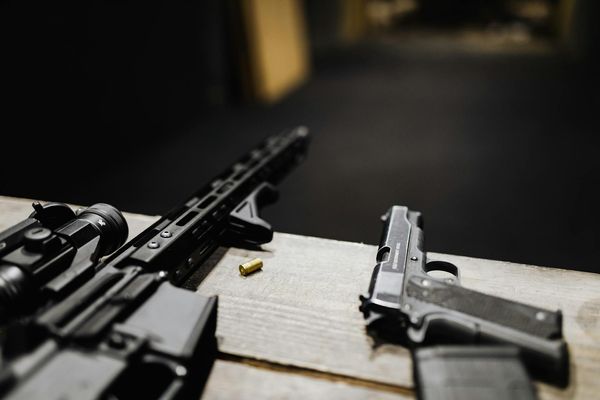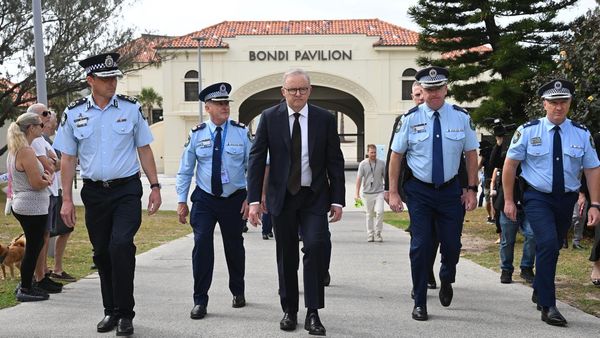
In June 2001, nine months after the toppling of Serbia’s autocratic president Slobodan Milošević, the Serbian capital, Belgrade, attempted to host its first Pride parade. The event, which organisers had envisaged as a celebration of a new, progressive era, turned into a chaotic nightmare.
News footage from that day shows groups of young men marching through the capital, chanting “kill, kill, kill a poof”. The ultras of Belgrade’s biggest football clubs momentarily put tribal animosities aside and ran riot across the city, beating up parade-goers and fighting running battles with the police that left two officers seriously injured.
This week, authorities in Belgrade put a stop to EuroPride, the landmark event in the continent’s LGBTQ+ calendar. The pan-European festival had opened in the Serbian capital on Monday, with organisers hopeful that it would serve as a measure of progress since 2001. But a last-minute police ban on Saturday’s EuroPride parade, the planned climax of the week-long programme, has cast a spotlight on the ongoing struggle for equality in the Balkans.
Tensions have surrounded the event since the Serbian president, Aleksandar Vučić, announced last month that EuroPride would have to be called off, out of fears that rightwing protests would lead to violent clashes. Vučić said he regretted it but cited a deepening security crisis with neighbouring Kosovo and economic pressures among other reasons for postponing EuroPride to “happier times”.
On Sunday, anti-pride demonstrators including biker gangs, religious groups and far-right nationalists rallied in the capital “for marriage and the family”, demanding that the EuroPride parade be banned.

Pride organisers had remained defiant, saying the Serbian government lacked the legal authority to cancel. A first day of scheduled events went ahead without incident on Monday, but on Tuesday police issued a ban on Saturday’s parade, as well as any counter-protests.
Kristine Garina, the Latvian president of the European Pride Organisers Association, said organisers were appealing against the ban in the courts. Either way, she said, a public gathering of some kind would go ahead on Saturday. Up to 10,000 people had been expected in Belgrade for the parade.
“All we need is for the legal system to work in Serbia and for the rule of law to be observed,” she said.
Belgrade was chosen over Barcelona, Dublin and Lisbon to host EuroPride 2022. Marko Mihailović, the 29-year-old figurehead of Belgrade Pride, led the city’s winning bid.
“This [cancellation] shows the necessity of hosting EuroPride in Belgrade,” Mihailović said. “The idea when we first presented our bid in 2019 was exactly that: to showcase EuroPride in a country that really needs it. We wanted to draw attention to the systematic discrimination and the lack of political will to resolve the issues that the community is facing.”

He said tolerance had increased in the Serbian capital but less so beyond it. “Visibility has increased – but that progress is just in Belgrade. The rest of Serbia is as homophobic as ever.”
Serbia, where same-sex unions are not lawful, represented a new frontier for the wider LGBTQ+ movement, Garina said. “After EuroPride went to Warsaw in 2010 and Riga in 2015, Belgrade seemed like a natural next step in terms of being political and complicated.” She said the hope had been to “change the whole region and finally push things forward in LGBTQ+ rights in the Balkans”.
It has been a bumpy road even to this juncture. After 2001, activists defiantly tried to reorganise, but municipal authorities cancelled year after year, citing security concerns and claiming that they were unable to ensure the safety of participants.
When Serbia became a candidate for EU membership in 2009, the government came under pressure from Brussels to prove its commitment to democratic values. Organisers got the green light in 2010, but Pride was once again marred by far-right violence and rioting. Garina, who was there, recalls that Belgrade “looked like a war zone”.

With a big police presence, Pride finally went ahead peacefully in 2014. Vučić, a former far-right radical, became prime minister that year after moderating his politics and winning the support of EU bigwigs.
In 2017, Vučić even appointed the gay politician Ana Brnabić as his prime ministerial replacement when he became president. Yet little of substance has been done for Serbia’s LGBTQ+ people. Civil partnerships that give same-sex couples the same rights as married ones, for example, remain nonexistent.
And while local far-right activists appear to have quietly accepted defeat over Belgrade Pride, a tame and small-scale annual event, the ferocity of their opposition to EuroPride reveals that social attitudes are not much different from 2001.

The strongest and most consistent opposition to LGBTQ+ rights in Serbia has come from Dveri, a party of hard-right religious conservatives that often organises a “family values parade” on the day of Belgrade Pride as a form of counter-protest. This year, the party lobbied for a parliamentary vote to ban Pride and, when that failed, it organised protests. Dveri said public funds allotted to EuroPride should be redirected to the treatment of sick children.
“Over 85% of Serbian citizens are against the promotion of homosexualism and Pride, that’s the issue here,” said Andrej Mitic, Dveri’s mild-mannered international secretary. “We regard this as the tyranny of an extreme minority that’s trying to impose its own values in contradiction to the collective moral values of society.”
Mitic said that Dveri members were not against human rights or anti-discrimination laws protecting LGBTQ+ individuals in the workplace, for example, but that they opposed “the promotion of ideological homosexualism” that Pride represented.
Although Dveri is a negligible force in national politics – the party won just 4% of the vote in this year’s election – a supermajority of parliamentary seats are held by right-leaning parties that have no electoral incentive to improve LGBTQ+ rights. A large number of influential far-right movements have been vocal in their opposition to EuroPride over recent months, which may have led Vučić to cancel the event.

Mihailović and fellow organisers had seen EuroPride 2022 as a chance to take the event back to its political roots and remind participants from across Europe that Pride was not merely an opportunity to party. But he said the risk of a violent backlash had grown this year.
“There have been more rightwing extremists spreading lies and malicious conspiracy theories in the media than in previous years,” he said. “Hate speech has been far more prevalent, there have been calls for violence, calls to use weapons to prevent Pride – no one has even been detained or questioned over that, let alone prosecuted.”
For now it appears that the extremists have got their way. However, Mihailović remains defiant, and says that the far right has not won. “Absolutely not. This is actually a win for us because it exposes all the faults within our system and the reality of the people who are in power. This is not a loss in any way.”
But at the same time, he expresses fears about the future of the battle for equality in the country. “I’m more concerned about next year,” he admits. “Next year we won’t have the visibility that we have this year. If it’s this bad this year, then I’m afraid of what’s going to happen next year.”







